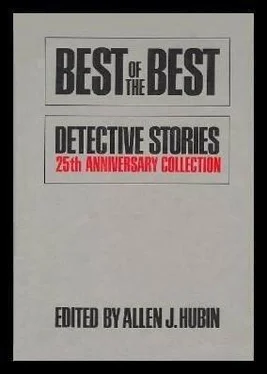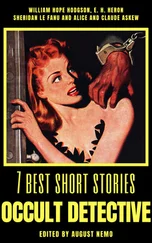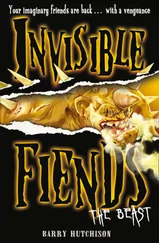Stephen Barr - Best of the best detective stories - 25th anniversary collection
Здесь есть возможность читать онлайн «Stephen Barr - Best of the best detective stories - 25th anniversary collection» весь текст электронной книги совершенно бесплатно (целиком полную версию без сокращений). В некоторых случаях можно слушать аудио, скачать через торрент в формате fb2 и присутствует краткое содержание. Город: New York, Год выпуска: 1971, ISBN: 1971, Издательство: E.P. Dutton & Co., Жанр: Детектив, на английском языке. Описание произведения, (предисловие) а так же отзывы посетителей доступны на портале библиотеки ЛибКат.
- Название:Best of the best detective stories: 25th anniversary collection
- Автор:
- Издательство:E.P. Dutton & Co.
- Жанр:
- Год:1971
- Город:New York
- ISBN:978-0-525-06450-3
- Рейтинг книги:5 / 5. Голосов: 1
-
Избранное:Добавить в избранное
- Отзывы:
-
Ваша оценка:
- 100
- 1
- 2
- 3
- 4
- 5
Best of the best detective stories: 25th anniversary collection: краткое содержание, описание и аннотация
Предлагаем к чтению аннотацию, описание, краткое содержание или предисловие (зависит от того, что написал сам автор книги «Best of the best detective stories: 25th anniversary collection»). Если вы не нашли необходимую информацию о книге — напишите в комментариях, мы постараемся отыскать её.
Best of the best detective stories: 25th anniversary collection — читать онлайн бесплатно полную книгу (весь текст) целиком
Ниже представлен текст книги, разбитый по страницам. Система сохранения места последней прочитанной страницы, позволяет с удобством читать онлайн бесплатно книгу «Best of the best detective stories: 25th anniversary collection», без необходимости каждый раз заново искать на чём Вы остановились. Поставьте закладку, и сможете в любой момент перейти на страницу, на которой закончили чтение.
Интервал:
Закладка:
“I—” Crane was feeling a lot better now that he was sitting. “Of course I’m all right,” he said testily. “Why?”
“Well, you look sort of green.”
Crane chuckled. “That’s what comes of being an accountant. Too much indoor work. Mind rushing that coffee? I’m late.”
The counterman looked sharply at him and then turned to the coffee urn. Behind the counter there was a flyspecked mirror which had been blocked off by the counterman’s broad body. Now Crane saw himself in it, sitting hunched forward with his hat pulled low over his forehead and a cigarette dangling from his thin mouth. His long, angular face, he thought, looked like a death’s head. He had never cared for his face, but Ellen said she loved it. But now it was pinched more than usual, and his complexion, which had always been sallow, was actually green.
I hope I’m not coming down with any sickness, he thought, and glanced at the wall clock over the door. It said twenty to eleven.
“Your clock’s fast,” he told the counterman as the coffee was set down before him.
“Maybe a couple of minutes.”
“You mean three hours,” Crane said and looked at his wrist-watch. The hands read the same as those on the wall clock.
It couldn’t be. He had left at seven-fifteen to reach Ellen’s apartment at seven-thirty. He had gone out of his way, so maybe he was a few minutes late. But three hours? And without remembering a single minute of those hours?
In the mirror he saw fear spring into his eyes. “Listen,” he said tensely. “Is this Friday, October twenty-seventh?”
The counterman’s brows creased. “Sure it is, mister. Say, you’re as sick as you look if you ain’t even sure what day it is.”
Crane sighed. At least it wasn’t amnesia or anything like that. But three hours lost!
Then he thought he had the answer. For some reason he had read the clock hands wrong. Not twenty to eleven, but five to eight. He turned his head to again look at the wall clock. He had been right the first time; it was the hour hand which was almost on the eleven.
“Holy God!” the counterman cried. “What happened to you, mister?”
“Eh?”
Crane took his eyes from the clock. The counterman was racing around the counter. In bewilderment, Crane watched him.
“Your head!” The counterman stepped behind Crane, and his voice was shrill with horror. “Holy God!”
Crane put a hand to the back of his neck. He felt the short hairs at the nape matted as if stuck with glue.
“Blood?” he muttered incredulously.
“It’s all over the back of your jacket and—” The counterman’s eyes bulged. “Jeez, don’t you feel nothing, mister?”
“Why, no,” Crane said slowly. “I felt a little sick to my stomach a little while ago, but it’s gone away. It must be just a flesh wound.”
“A flesh wound!” The counterman’s manner suddenly became gentle and anxious. “Now don’t you move, mister. Stay right where you are. Just you sit there while I call an ambulance.”
“Oh, come,” Crane said in annoyance. “It can’t be much if I don’t feel it. I’ll wash up at my girl friend’s place.”
“You stay where you are.” The counterman dug a coin out of his apron and rushed to the phone booth. When he was inside, he stuck his head out. “Don’t get off that chair, mister. Don’t try walking. Take it easy.”
Crane scowled into his coffee. One thing was clear: the blow on his head was responsible for the three lost hours. But he couldn’t remember what had happened. Had he fallen? Had somebody socked him and taken his money?
He fished out his wallet. Twenty-eight dollars — check. He had had nothing else of value on his person. So it had to be a fall. But where and how?
In the phone booth the counterman was saying: “Yeah, on Washington, right off Fifth. And you better hurry.”
What was the guy getting so excited about? So he had lost a little blood. The wound couldn’t amount to much because he didn’t feel any after-effects. Again Crane put his hand up to the back of his neck. Nothing there except dried blood. His hand started to move up.
That was when the street door opened and a thick-set, swarthy man came in. He started to close the door behind him and then froze. He gaped at Crane; his thick lips began to tremble and sweat formed beads on his brow.
Crane swung on his stool so he could face the newcomer directly. He was sure he had never seen him before. Yet this man was as scared of him as the woman in the doorway had been.
“Do you know me?” Crane demanded, getting off the stool.
Crane felt himself shudder. Maybe the woman who had screamed had been frightened by the sight of blood, and the counterman thought he was hurt badly enough to need treatment — but the swarthy man hadn’t seen the back of his head. Crane had been turned partly toward him when he had entered.
What had happened during those three lost hours? Was the swarthy man in any way connected with the wound?
He moved to the door. Sidelong through the window he saw the swarthy man standing thirty feet beyond the store and looking back. He seemed to be hesitating over something.
Anger gripped Crane. he’d get to the bottom of this. he’d make the swarthy man tell him why he was afraid of him.
He flung the door open. The counterman came out of the booth and yelled: “Hey, mister, for God’s sake! The ambulance’s coming! Don’t—”
Crane kept going.
The moment the swarthy man saw Crane appear in the street, he started walking rapidly uptown. He did not quite run.
“Just a minute,” Crane called as he moved after him. “I only want to ask you—”
The swarthy man put his head down and dug his hands into his pockets and pumped his short legs. Crane’s longer legs cut down the distance between them.
Then the swarthy man was out of sight around the Sixth Street corner. And when Crane rounded the corner, the other was waiting for him, with his wide shoulders pressed against the wall and a big ugly revolver in his hand.
“Keep away from me!” the swarthy man panted.
Crane blinked down at the gun. He said: “Don’t be foolish. I only want to ask you how you happen to know me.”
There wasn’t much light, but Crane could see the other’s face strained in fear. It didn’t look like a face that frightened easily. It was a hard and cruel and ruthless face — or had been up to a minute ago.
“You’re dead!” the swarthy man whimpered. “Don’t touch me!”
Everybody he had met in the last few minutes was stark, raving mad, Crane told himself. Or maybe it was he himself who had lost his reason. He had to know. He decided to humor him.
“How do you know I’m dead?” Crane said. “If you never saw me before—”
The gun jerked up, and for the first time Crane realized the full menace of it. The damn idiot would actually shoot!
“You can’t trick me,” the swarthy man said hoarsely. “You want me to say right out how I know you’re dead. You want to make sure. Well, this time I’ll make sure.” And his hand contracted about the trigger of the gun.
There was a feeble click. Nothing else.
The swarthy man looked down at his gun. Then he looked up into Crane’s face. With a choked cry, he dashed past Crane and wildly up the street.
Crane remained rooted to the spot, watching the flight of that stocky shape until it was out of sight. He did not try to follow. He was afraid of a gun which unaccountably had not killed him. And he was afraid of more than a gun — of something he did not understand or even know, but that now was becoming a dim, nagging memory in back of his consciousness.
A siren sounded and then an ambulance swept past him. Looking around the corner, he saw it come to a stop in front of the lunchroom. The ambulance was for him.
Читать дальшеИнтервал:
Закладка:
Похожие книги на «Best of the best detective stories: 25th anniversary collection»
Представляем Вашему вниманию похожие книги на «Best of the best detective stories: 25th anniversary collection» списком для выбора. Мы отобрали схожую по названию и смыслу литературу в надежде предоставить читателям больше вариантов отыскать новые, интересные, ещё непрочитанные произведения.
Обсуждение, отзывы о книге «Best of the best detective stories: 25th anniversary collection» и просто собственные мнения читателей. Оставьте ваши комментарии, напишите, что Вы думаете о произведении, его смысле или главных героях. Укажите что конкретно понравилось, а что нет, и почему Вы так считаете.












